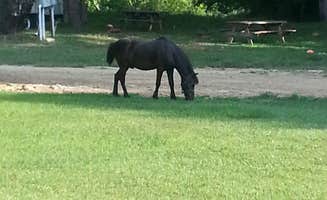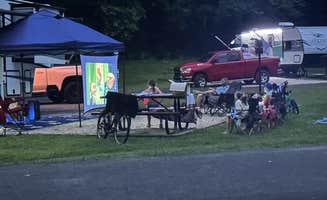Equestrian camping near Kiahsville, West Virginia provides direct access to forest trails and lake recreation in the Appalachian foothills. The region sits approximately 600-800 feet above sea level with limestone geology creating unique riding terrain. Summers average 85°F with regular afternoon thunderstorms, while spring and fall maintain comfortable 60-75°F conditions for trail riding.
What to do
Trail riding: Access over 100 miles of established trails at Lake Vesuvius Recreation Area in the nearby Wayne National Forest. "Great place to camp and kayak. Must camp 150ft from the trail. No cell service. Beautiful park," notes Neal C. The trails accommodate various riding abilities with multiple interconnected loops.
Water activities: Cool off after riding at Greenbo Lake State Park where you can access 225 acres of lake surface for fishing and boating. "Very nice and quiet campground with an awesome lake to kayak," reports Wyatt H. The lake maintains good water quality for swimming horses at designated areas only.
Wildlife observation: Many trails feature wildlife viewing opportunities, particularly deer and seasonal elk populations. The park system maintains several water crossings where natural wildlife congregates. Trail maps marking these areas are available at ranger stations.
What campers like
Quieter alternatives: When Paddle Creek gets crowded, experienced riders prefer Iron Ridge - Lake Vesuvius for its more secluded camping options. "Very clean and private campsites," notes Ashley F. Sites are spaced further apart with natural barriers between them, providing separation for horses and trailers.
Overnight facilities: Carter Caves State Resort Park Campground offers alternatives for equestrian camping with more established amenities. "Primitive camping and RV space. You can rent a cabin and such. There is a resort. Everything always looks really nice," explains Aaron R. Covered boarding options exist for severe weather.
Trailer access: Most sites accommodate standard horse trailers with parking areas adjacent to camping spots. Larger rigs may require advance planning as not all facilities have pull-through sites. Ground conditions remain suitable for parking throughout most of the year except during heavy rain periods.
What you should know
Site selection considerations: When booking at German Bridge - Dewey Lake, understand the options for horse boarding. "For an extra fee ($15 I think, we don't have horses) you could board your horse in the barn," explains Stephanie T. Not all sites have direct trail access, so check maps before reserving.
Required permits: Most trails require trail permits purchased at the ranger stations. Daily permits cost $5-10 per rider with discounts for weekly or seasonal passes. Some areas require proof of negative Coggins test.
Manure management: All sites enforce strict manure management rules. You must bring tools to properly dispose of manure, either in designated areas or by packing it out. Failure to comply can result in fines up to $150 per incident.
Weather challenges: The region experiences rapid weather changes, particularly in spring and fall. Pack rain gear year-round as afternoon storms develop quickly in mountainous terrain, often with limited shelter options on trails.
Tips for camping with families
Beginner-friendly trails: The Ashland Huntington West KOA offers access to less challenging terrain suitable for young riders. "Not much shade but then again it's a fairly new KOA and the trees haven't had time to grow," notes Jerry S. Trails near this facility maintain gentler grades with fewer technical challenges.
Non-riding activities: For days when not everyone wants to ride, "KOA staff was very friendly and accommodating. The campground has miniature golf, a playground, a fenced area for dogs, a pond and a swimming pool," suggests Joseph C.
Safety instruction: Some facilities offer riding clinics for children on weekends during summer months. These typically run 1-2 hours and cost $20-30 per child. Reserve spots in advance as they fill quickly, especially holiday weekends.
Trail readiness: Ensure young riders understand basic trail commands and signals before heading out. Practice emergency dismounts and basic horsemanship at the campsite before attempting longer trail rides.
Tips from RVers
Hookup considerations: When bringing an RV with horse trailers, Chief Logan State Park Campground offers practical accommodations. "Chief Logan has 26 level RV camping spots with water and electricity at all sites and a sewer connection at about half of them," explains Jennifer B. However, larger rigs may struggle with tighter turns on mountain roads.
Water access issues: Multiple campers report unexpected water hookup challenges. "You share a water spigot with a neighbor so you have to have a long hose to go across your whole section," warns one camper. Bring at least 50 feet of drinking-safe hose.
Power requirements: Horse-focused campsites often have higher power demands from multiple RVs. "We just had to watch and not use electrical appliances while the air was on," advises Karen P. Consider bringing a generator backup if running essential equipment.
Campsite leveling: Forest service campgrounds typically feature less improved sites. "Some sites are sloped from slight to more severe. We did have to take our camper off our truck in order to get level," reports Liz from Lake Vesuvius. Bring extra leveling blocks, especially for larger units.



